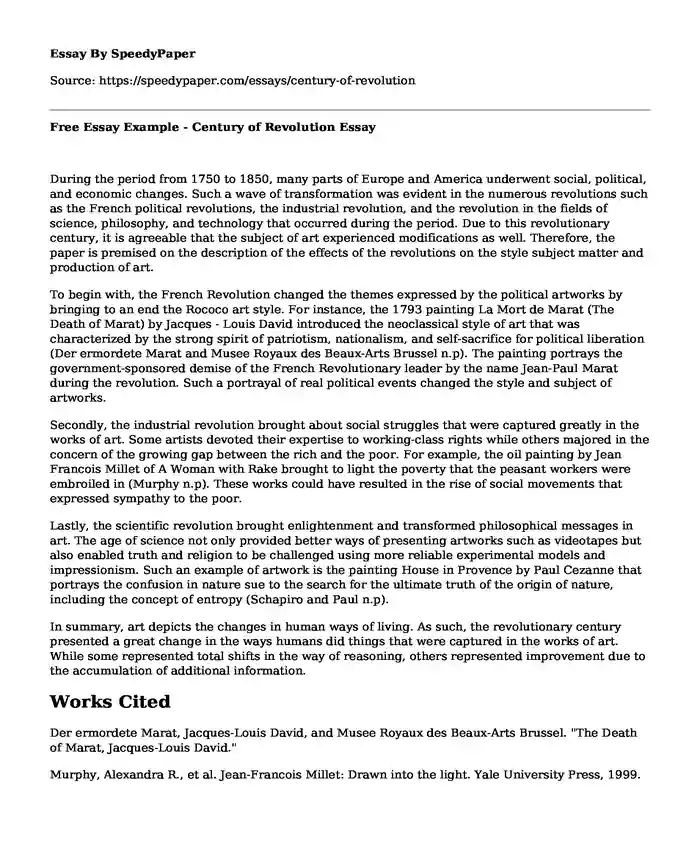
| Type of paper: | Essay |
| Categories: | Art French Revolution Industrial revolution |
| Pages: | 2 |
| Wordcount: | 466 words |
During the period from 1750 to 1850, many parts of Europe and America underwent social, political, and economic changes. Such a wave of transformation was evident in the numerous revolutions such as the French political revolutions, the industrial revolution, and the revolution in the fields of science, philosophy, and technology that occurred during the period. Due to this revolutionary century, it is agreeable that the subject of art experienced modifications as well. Therefore, the paper is premised on the description of the effects of the revolutions on the style subject matter and production of art.
To begin with, the French Revolution changed the themes expressed by the political artworks by bringing to an end the Rococo art style. For instance, the 1793 painting La Mort de Marat (The Death of Marat) by Jacques - Louis David introduced the neoclassical style of art that was characterized by the strong spirit of patriotism, nationalism, and self-sacrifice for political liberation (Der ermordete Marat and Musee Royaux des Beaux-Arts Brussel n.p). The painting portrays the government-sponsored demise of the French Revolutionary leader by the name Jean-Paul Marat during the revolution. Such a portrayal of real political events changed the style and subject of artworks.
Secondly, the industrial revolution brought about social struggles that were captured greatly in the works of art. Some artists devoted their expertise to working-class rights while others majored in the concern of the growing gap between the rich and the poor. For example, the oil painting by Jean Francois Millet of A Woman with Rake brought to light the poverty that the peasant workers were embroiled in (Murphy n.p). These works could have resulted in the rise of social movements that expressed sympathy to the poor.
Lastly, the scientific revolution brought enlightenment and transformed philosophical messages in art. The age of science not only provided better ways of presenting artworks such as videotapes but also enabled truth and religion to be challenged using more reliable experimental models and impressionism. Such an example of artwork is the painting House in Provence by Paul Cezanne that portrays the confusion in nature sue to the search for the ultimate truth of the origin of nature, including the concept of entropy (Schapiro and Paul n.p).
In summary, art depicts the changes in human ways of living. As such, the revolutionary century presented a great change in the ways humans did things that were captured in the works of art. While some represented total shifts in the way of reasoning, others represented improvement due to the accumulation of additional information.
Works Cited
Der ermordete Marat, Jacques-Louis David, and Musee Royaux des Beaux-Arts Brussel. "The Death of Marat, Jacques-Louis David."
Murphy, Alexandra R., et al. Jean-Francois Millet: Drawn into the light. Yale University Press, 1999.
Schapiro, Meyer, and Paul Cezanne. Paul Cezanne. Abrams, 1965.
Cite this page
Free Essay Example - Century of Revolution. (2023, Mar 21). Retrieved from https://speedypaper.com/essays/century-of-revolution
Request Removal
If you are the original author of this essay and no longer wish to have it published on the SpeedyPaper website, please click below to request its removal:
- The Case of Freddie Gray - Police Brutality Paper Sample
- English as an International Language, Free Essay with Articles Review
- HVAC Principles Essay Sample
- Free Essay on the Effects of a Trade War Between the United States and China
- The Impact of Creativity on Job Satisfaction in Phys.
- Public Relations Budgeting, Free Essay for Everyone
- Auditing Bank Reconciliations
Popular categories




